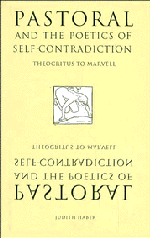Book contents
- Frontmatter
- Contents
- Acknowledgments
- Texts and abbreviations
- Introduction: “Remedies themselves complain”: pastoral poetry, pastoral criticism
- 1 Bringing it all back home: bucolic and heroic in Theocritus' Idylls
- 2 Si numquam fallit imago: Virgil's revision of Theocritus
- 3 Pastime and passion: the impasse in the Old Arcadia
- 4 Complaints themselves remedy: Marvell's lyrics as problem and solution
- Epilogue Farewell to pastoral: The Shepherd's Week
- Notes
- Works cited
- Index
3 - Pastime and passion: the impasse in the Old Arcadia
Published online by Cambridge University Press: 17 August 2009
- Frontmatter
- Contents
- Acknowledgments
- Texts and abbreviations
- Introduction: “Remedies themselves complain”: pastoral poetry, pastoral criticism
- 1 Bringing it all back home: bucolic and heroic in Theocritus' Idylls
- 2 Si numquam fallit imago: Virgil's revision of Theocritus
- 3 Pastime and passion: the impasse in the Old Arcadia
- 4 Complaints themselves remedy: Marvell's lyrics as problem and solution
- Epilogue Farewell to pastoral: The Shepherd's Week
- Notes
- Works cited
- Index
Summary
In the Renaissance, the suspensions that Virgil had effected begin to come apart. The proliferation of different pastoral forms during this period is, itself, a sign of the fragmentation that is taking place. While the eclogue continues to be centrally important, the form that best represents the problems and the possibilities of the mode for poets of the English Renaissance is the pastoral romance: even important eclogue collections of the time (e.g., The Shepheardes Calendar) participate in the general movement towards narrative that is most fully realized in the romance.
In the following chapter, I will consider the attractions and the drawbacks of the Renaissance pastoral romance through an extended analysis of Sidney's Old Arcadia; I will then briefly examine the responses of Spenser and Shakespeare to the problems that Sidney locates in the form. Even more obviously than other English poets, Sidney sees the structure of pastoral romance as inherently problematic. In his later work, he expresses his dissatisfactions by moving away from a focus on pastoral per se. In his Old Arcadia, however, he makes the contradictions he perceives an integral part of his subject: he thus presents us with an especially clear picture of the difficulties that contemporary pastoralists were repeatedly confronting and attempting to resolve.
In the romance, the balance of stasis and movement – of lyric and drama – that had characterized the Eclogues is necessarily disrupted: the introduction of narrative forces us to move beyond Virgil's suspended moments, to see what exists on the other side of their limits.
- Type
- Chapter
- Information
- Pastoral and the Poetics of Self-ContradictionTheocritus to Marvell, pp. 53 - 97Publisher: Cambridge University PressPrint publication year: 1995



